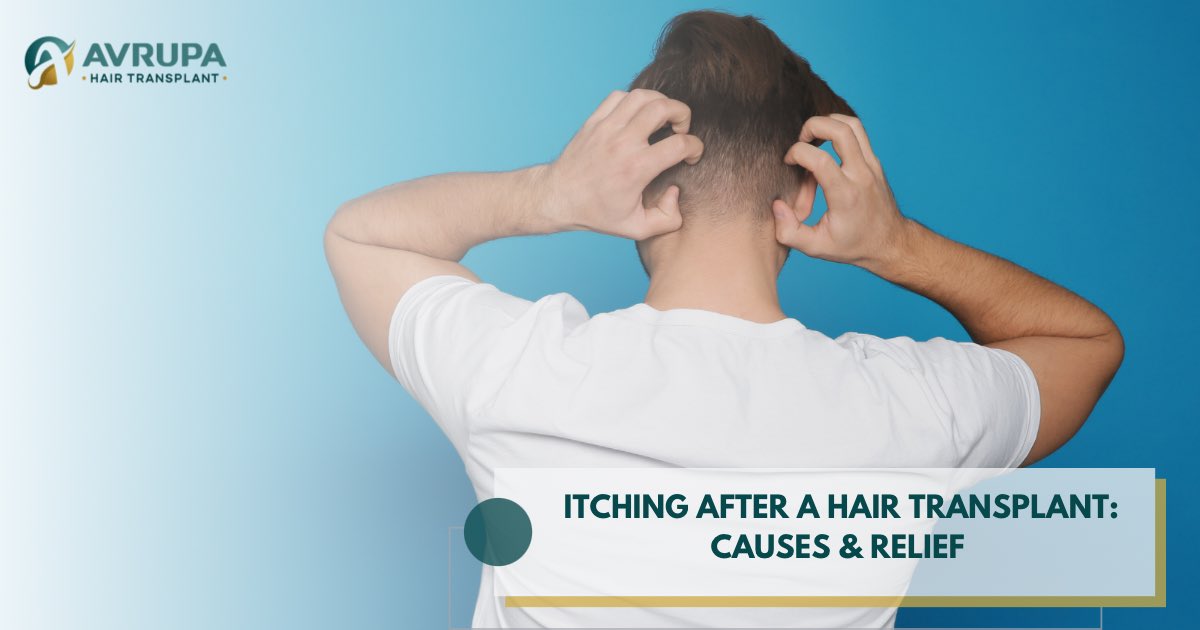
Itching After Hair Transplant: Causes, Symptoms, and Relief

November 17, 2024 by
avrupahairtransplant
Itching is a common experience following a hair transplant, typically occurring during the healing process as the scalp recovers from surgery. This itching can vary from mild to intense, often caused by factors such as natural healing, dry skin, and small scabs that form around newly transplanted follicles. For most patients, itching is a temporary and manageable phase that typically begins a few days after the procedure and subsides within the first few weeks. Common causes of post-transplant itching include healing wounds, inflammation, and increased sensitivity in the affected area, such as the scalp.
While itching after a hair transplant is generally harmless, managing it effectively is essential for patient comfort and to prevent unnecessary scratching that could dislodge grafts or irritate the scalp. Understanding the reasons behind post-transplant itching and learning techniques to alleviate it can help make the recovery period more comfortable and contribute to better transplant outcomes.
What Causes Itching After Hair Transplant?
Itching after a hair transplant is a natural reaction that arises as the scalp heals from the procedure. Here are the primary causes:
- Healing Wounds: Small incisions created during the transplant can cause mild inflammation as they heal, leading to temporary itching.
- Dry Skin: The healing process and formation of small scabs can cause dryness, leading to an itchy sensation.
- Increased Sensitivity: Transplanted follicles may increase sensitivity in the scalp, contributing to the itchy feeling.
- Inflammation: Minor inflammation around the newly transplanted follicles is common and can result in itching as part of the recovery phase.
What Are the Symptoms of Post-Transplant Itching?
Dr. Angela Morris, a dermatologist with experience in post-transplant care, notes these typical symptoms of post-transplant itching:
- Mild to Intense Itching: The intensity of itching can vary from mild to intense, depending on the individual’s healing response.
- Localized to the Transplant Area: Itching is typically localized to the transplanted follicles and surrounding areas of the scalp.
- Dryness or Flakiness: As the scalp heals, it may become dry or flaky, which can contribute to itching.
How Long Does Itching Last After a Hair Transplant?
The duration of itching after a hair transplant varies but follows a typical timeline for most patients:
- 1-2 Weeks: Mild itching generally begins within the first few days and may last up to two weeks.
- Up to 3 Weeks in Some Cases: For some patients, itching may persist for up to three weeks, especially if the scalp is naturally dry.
How to Diagnose Excessive Itching or Complications?
Although itching is normal, certain signs may indicate complications if the itching persists or worsens. Diagnosis includes:
- Self-Observation: If itching is intense, accompanied by redness or swelling, or persists beyond three weeks, it may require attention.
- Consulting a Dermatologist or Surgeon: If symptoms are prolonged or unusual, consult your surgeon or a dermatologist for an assessment. They can determine if further treatment is needed.
What Are the Treatments for Itching After Hair Transplant?
Effective treatments can help alleviate itching and improve comfort during recovery. Here are some of the best options:
- Using Moisturizing Sprays: Moisturizing sprays can help soothe dryness, a common cause of itching.
- Applying Doctor-Recommended Anti-Itch Creams: Certain creams recommended by your doctor can help alleviate itching without harming grafts.
- Avoiding Scratching or Touching the Scalp: Refrain from scratching or touching the itchy areas, as this can disrupt the healing process of the follicles.
- Using Mild Shampoo for Gentle Cleansing: A mild, gentle shampoo keeps the scalp clean without causing irritation or dryness.
- Taking Antihistamines (If Advised by Your Doctor): In some cases, your doctor may recommend antihistamines to help manage itching.
- Practicing Scalp Hydration with Saline Sprays: Saline sprays can keep the scalp hydrated and reduce itching caused by dryness.
- Using Cold Compresses for Temporary Relief: Applying a cold compress can provide temporary relief from itching and reduce inflammation.
- Consulting Your Surgeon for Persistent Itching: If itching persists for more than three weeks, consult your surgeon for further advice or additional treatment options.
What Are the Best Aftercare Practices to Minimize Itching?
- Keeping the Scalp Clean and Hydrated: Gently cleanse the scalp as instructed by your doctor, using non-irritating products to avoid dryness.
- Avoiding Harsh Hair Products: Opt for mild, fragrance-free products specifically designed for sensitive skin to minimize the risk of irritation.
Common Complications Linked to Itching Post-Transplant
- Can Persistent Itching Cause Graft Loss? Yes, excessive scratching or irritation can dislodge grafts, which may impact the success of the transplant.
- Can Itching Lead to Scalp Infections? Persistent scratching may break the skin, increasing the risk of infection. Proper care is essential to avoid this.
- Does Itching Indicate Poor Healing? Mild itching is normal, but severe or prolonged itching may indicate underlying issues, such as inflammation, that require attention.
FAQs about Itching After Hair Transplant
- Is Itching Normal After a Hair Transplant? Yes, mild to moderate itching is a standard part of the healing process and generally resolves within a few weeks.
- When Should I Be Concerned About Itching? If itching is intense, persistent, or accompanied by redness and swelling, consult your doctor.
- Can Lifestyle Factors Affect Post-Transplant Itching? Yes, factors such as scalp dryness, hydration, and product choices can influence the severity of itching.
- Are There Natural Remedies for Itching Relief? Using cold compresses and saline sprays can provide natural relief for mild itching without impacting the grafts.
- Does Itching Affect Hair Growth? Itching itself does not affect hair growth, but excessive scratching could disrupt grafts and impact growth if not managed.
Written By
avrupahairtransplant
Avrupa Hair Transplant Clinic, Istanbul’s trusted name since 2006, transforms hair restoration with cutting-edge techniques like FUE, DHI, and Sapphire, crafting natural, lasting results. With over 40,000 success stories and a collection of international awards, Avrupa blends innovation with artistry, delivering personalized care that redefines confidence for clients worldwide.